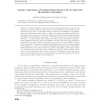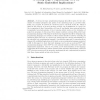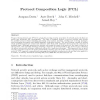260 search results - page 15 / 52 » On the Logic Underlying Common Sense |
NMR
2004
Springer
14 years 4 months ago
2004
Springer
This paper presents statistical default logic, an expansion of classical (i.e., Reiter) default logic that allows us to model common inference patterns found in standard inferenti...
CORR
2007
Springer
13 years 11 months ago
2007
Springer
Formal verification using the model checking paradigm has to deal with two aspects: The system models are structured, often as products of components, and the specification logic...
FOSSACS
1999
Springer
14 years 3 months ago
1999
Springer
Abstract. A strong (L) logic programming language ([14, 15]) is given by two subclasses of formulas (programs and goals) of the underlying logic L, provided that: firstly, any pro...
ENTCS
2007
13 years 10 months ago
2007
Protocol Composition Logic (PCL) is a logic for proving security properties of network protocols that use public and symmetric key cryptography. The logic is designed around a pro...
ESOP
2010
Springer
14 years 8 months ago
2010
Springer
Formal reasoning about concurrent programs is usually done with the assumption that the underlying memory model is sequentially consistent, i.e. the execution outcome is equivalen...



